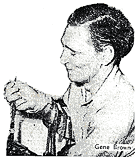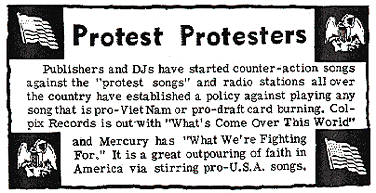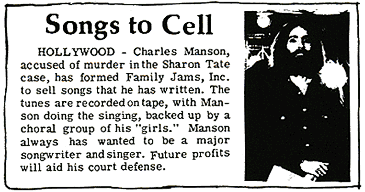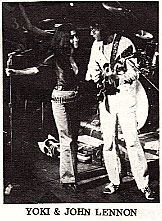















































 From 1946 to 1979, song-poem fans eager to keep abreast of goings-on in the industry needed only to turn to the pages of Songwriter's Review. Syde Berman's monthly newsletter (later halved to bimonthly) was the closest thing amateur songwriters had to their own Billboard. Reading SR is like peeking through the keyhole into a parallel songwriters' universe, where eccentric talents such as Norridge Mayhams, Jimmy Drake and Hasil Adkins were major stars and shifty outfits such as Film City, Sterling and Nordyke powerhouse corporations.
From 1946 to 1979, song-poem fans eager to keep abreast of goings-on in the industry needed only to turn to the pages of Songwriter's Review. Syde Berman's monthly newsletter (later halved to bimonthly) was the closest thing amateur songwriters had to their own Billboard. Reading SR is like peeking through the keyhole into a parallel songwriters' universe, where eccentric talents such as Norridge Mayhams, Jimmy Drake and Hasil Adkins were major stars and shifty outfits such as Film City, Sterling and Nordyke powerhouse corporations.One of Berman's pet projects was the Songwriter's Educational Committee, a perpetual fund aimed at underwriting subscriptions to public libraries throughout the country. Berman's foresight has been a boon to the latter-day song-poem researcher, but the fact of the matter is that libraries tended to maintain their respective subscriptions only for stretches, so it has been a trick to gain access to the full run of issues. Aided by AS/PMA field reps as well as library staffers, we have managed to come pretty close, amassing a fairly inclusive collection of photocopies of key pages from throughout SR's span. We are still only midway through the task of reading and documenting these pages, but they have already provided us with invaluable information and insights into the workings and personalities of the song-poem industry. Many items gleaned from the pages of SR have already been implemented throughout this website, and we are certain that many more still will inform the pages of the book we're preparing.
From time to time in our strolls through the pages of SR we encounter an item that we want to bring to your attention as soon as possible, and which will probably not be pertinent enough for inclusion in the book. This page is devoted to the presentation of those items.
Note: From here on, AS/PMA comments will appear in grey.
The Songwriter's Review holds much valuable information. Thanks again for my copy. Here's hoping I receive one in 1999.
FRITZ HUGH SIMS, Philadelphia
Fritz, let's hope we're both around in 1999 and the Review no longer has to devote so much space to songsharks and their protectors. --Ed.
Jackman's story starts in the very early days of the music business, when Tin Pan Alley was just getting started, and song-pluggers went from cabaret to theater singing their songs. Jackman, himself, mixed in with the boys and did a bit of singing in those early days.
"Singing in the back rooms inspired me to write a song," he told us. "I wrote a lyric called 'In The Valley Where The Sweet Red Roses Bloom.' I gave it and $35 to an Edward Madden Music Co., on East 28th St., between 3rd and Lexington Ave., and he promised to write the music and publish it. He
kept his part of the contract and I still have the engraved plates at home. I received a royalty contract from the Melville Music Pub. Co., also on the old Tin Pan Alley, 28th St., and it called for $35 to publish my song. Before I could do anything, the firm folded up."
Jackman had an experience with another early music company that also wanted $35 to publish his song. But this company also went out of business.
"This cured me for a while," Jackman went on, "but in 1921 I came back with an Irish song and had a fellow by the name of Cornell write the music for me. He also acted as my agent. I worked very hard on this song. But Mr. Cornell got in trouble with the Postal Inspector and a friend called to say he had salvaged my Irish number from the rubbish in front of the Old Gaiety Theater building. I lost about $500 on this deal."
Jackman had a few more similar experiences, stopped writing for a while, but now he's back in there again with a new group of songs. And to show how forward looking he is, he's thinking of forming his own publishing company now, and going into business for himself with his own songs.
Right now a song is sold mainly on repetition. Get Sinatra to do it. Then get Como, Damone, Crosby, etc. It is this constant pounding away on a tune that makes it successful, on records and on the air.
Now look at the television view: the sound isn't going to be the all important matter. In video, it's going to be sight. The listener and the hearer become the see-er. When Sinatra appears on television, we're going to see the guy as well as hear him. And whenever sight & hearing get together, the emphasis is usually on sight. So Sinatra and all singers and bandleaders, are going to revise their methods and styles to conform to the seeing public. What might go over on radio will take more style, more effectiveness to satisfy television. Songs that are just ballads won't be strong enough. Lyrics will have to be emphasized more than ever before.
For bands it means that novelties may return. The old days of Horace Heidt, with "Lobo The Dog," for instance, may be right around the corner again. The public won't stand for a group of musicians sitting on a dias and sawing away. They'll want some life, some activity.
There's no doubt our songs have suffered from much radio and record promotion. They have become namby-pamby, standardized, formularized, and in every way strictly patterned. Television offers the opportunity of returning to real music and salesmanship in a song. It offers lyricists an opportunity to get away from the "Moon and June" routines. Because video offers a singer a greater chance than ever to sell a song.
So sit tight. Don't expect the amusement business to disappear once those receivers start cropping up in thousands [sic] more homes. It's going to change the amusement business -- that's true. But so far as songwriting is concerned, the changes will be all for the better.
But that wasn't the whole story. No one knew the full story until the song had been placed and recorded. For Gene Brown didn't want any special consideration because of his physical handicap; he wanted to gain recognition on the basis of his own value, and not because he is a spastic by birth, and has lived in this prison for the full 26 years of his life.
Although a Review subscriber for a number of years, his condition was not known to the magazine staff. Neither did the publishers, Association, or record company know of it -- until the Los Angeles Times devoted a story to Gene Brown and his desire to escape into the world of recognition thru music.
Gene can talk, but the words are held back by his palsy. An all-understanding and loving mother knows his every desire, and interprets his wishes. She lives up to the Times statement of being "a special kind of mother."
Gene can typewrite but his fingers cannot point at the keys. He uses a drumstick with a rubber tip in his fist and pokes at keys. His arm must be anchored in a leather sleeve that is fixed in a swivel in his chair arm.
It is in this way that he writes his lyrics. Gene's lyric-writing career started eight years ago following his graduation from high school. It was an outlet for him and his dreams, and he put them all down on paper, in his almost impossible manner. The lyrics went out, and came back. It was eight years before Roy Gould, of the Songwriters Cooperative Association came into the picture, for Gene, and Gould saw merit in one of the lyrics. He completed it himself, musically, and before long it was accepted by Citation Music and recorded by RCA Victor by Johnny Vadnol.
Then, only, did all parties learn of the hopes and dreams of Gene Brown that were painstakingly being created on an electric typewriter with a rubber-tipped drumstick.
A lot of people now are pulling for Gene. Not only was the song of high calibre and worthy of a Victor recording, but the strength and power of Gene Brown in carrying on his work without revealing his difficulties, captured the imagination of all concerned.
Gene has taken a long step forward in escaping from his palsy prison. He has found his release in music.
Jerry Samuels, the kid referred to in the piece below, would infect the pop music world in 1966 with a bit of sickness called "They're Coming To Take Me Away, Ha-Haa!!," under the name Napoleon XIV.
You will note that Berman uses the word "lyrist" instead of "lyricist," insisting elsewhere that the latter appeared in no dictionary. "Lyrist" seems an inadequate replacement, though, since it actually means "one who plays the lyre." Both, of course, derive from a common source, so maybe -- by the standards of his era, at least -- he was right.
Samuels reports that he went to Columbia with his tune and was told to see publishers by the receptionist. At the Brill Building, he had no luck with the first four offices he contacted. The fifth liked the melody, not the lyric. Jerry's father contacted a lyrist and the song was polished up. The lyrist eventually took the tune to Happy Goday, a publisher (after Decca had turned it down) and Goday rushed the tune to Mitch Miller, back at Columbia, where it was immediately assigned to Ray.
The boy now is under contract to Goday and received a surprise when he learned he was going to get royalties for "doing what I love to do."
Publishers have stopped publishing songs with "twist" in the title. Even the latest Joey Dee film has deleted the word "twist." Atlantic has taken its Twist-time label off the disk market.
What's next? A & R men would like just a little inkling of what the new public taste will be. --GEORGE BANNER
The story making the rounds is this:
Frederick Loewe, music writer of My Fair Lady, Camelot and other big Broadway hits, was entertained at the White House by the Kennedys some time ago. He played some of his own melodies for the Kennedys and their guests. When he played a few of his new tunes, the President wanted to know just how a melody is written. Loewe asked the President to suggest a title -- and JFK said, "It's A Passing Thing." On the spot Loewe began composing a melody.
Several weeks later, Loewe heard that the President, and a guest at the dinner, Charles Spaulding, were collaborating on a lyric for the spot-composed "It's A Passing Thing."
No direct story confirmation could be obtained by The Review. Pierre Salinger, press secretary to the President, told The Review that "I certainly don't know of any plans for the President to collaborate with anyone to write lyrics."
Loewe, convinced that lyrics are being written, is trying to recall the melody he wrote that night at the White House!
Parr provided an orchestra with 10 violins to back up Nixon and his tune.
"If last November didn't finish me," he said, "this will, because, believe me, the Republicans don't want another piano player in the White House."
Original sounds are recorded on tape, then modified or transformed by electronic filters or reverberators. The scientist-musician decides on how he wants to blend the sequences and the final sounds are spliced together. The result: a combination.
The machines have not been used as yet for the popular field, and there is no contemplation of such usage in the near future. The scientists apparently don't want to compete with the echo chambers and strange sound effects of our rock 'n' roll tunes! - MAYO.
Acknowledging the parodies were written in the same meter, the judges declared that "no writer should be permitted to claim a property interest in iambic pentameter."
T.R. McGREGOR, Dayton, Pa.
It has romped into the United States out of the Caribbean, with the soulful blessing of the Jamaica Minister of Education, who hopes it will create new tourist trade for the Island.
Sitting on top of the new dance craze is Atlantic Records. The label's president, Ahmet Ertugen, beat all other diskering by winging to Jamaica and recording such units as the Blue Busters, Strangers & Patsy, The Charmers, and Maytals. In all, 40 sides were recorded and now are being released.
Capitol, Mercury and Victor all are getting their releases on to the market.
The Jamaica Ska is more rock than Calypso, despite its origin in Calypso territory. It is similar to England's "blue beat," containing a heavy backbeat with a shuffle rhythm.
It is a beat that is expected to appeal to the teenagers and therefore A & R men expect it to sweep the charts before long.
"Ska" is supposed to be the actual sound of the dance beat.
Leader John Lennon writes the songs the group sings, along with Paul McCartney, who was an English literature major student.
The group has sold 2-1/2 million records of their own songs, "Please, Please Me," "Love Me Do," "She Loves You," etc. When they appear at a theater, 5,000 screaming teenagers wait in line.
"'Beatle music" is similar to rock'n'roll, is high pitched, and as loud and repetitive as possible. The boys jump around and shake, shake, shake. No one knows where it will end.
by George Banner
Bob Hope described them as fellows who went to a barbership [sic] but couldn't wait for their turn.
The only songwriter of importance who appeared to approve of them was Richard Rodgers, and that approval came second-hand thru Ed Sullivan.
Manufacturers who were flooding the market with Beatle wigs, shirts, et al expected the peak to be reached during the second week of the Beatles' stay in this country. They see it as a quick, fast buck that will disappear as quickly as it mushroomed.
The boys were outspoken in their desire to make money as fast as they could. Their attraction primarily was to teenage girls. Few adults who saw the boys in action thought that it was a musical success. Most thought it put music back to the Presley days, and thwarted a quicker return to sane, sweeter music.
The trade expects this fad to die a quicker death than the belated twist.
The units, writing their own music, have their own publishing outlets and are rarely users of American songs. The Beatles, at the top of the heap, are reported ready to float a stock issue in the United States and England! - EARL MAYO.
The crest of the Beatles seems to have passed, leaving a lot of very rich, inept British singers and songwriters. The indifference is expected to reach America.
1999
Sharks Active In The Old Days, Says Jackman
British Songsharks, Too
"Video Offers A Singer A Greater Chance Than Ever To Sell A Song"
Rantings, Spewings & Sputterings
"Deliver Me O Lord From The Evil Of Song Sharks"
Do You Know (song-poem puzzle)
Song Aids Leper Colony
First Base
Spastic Escapes Prison Of Body By Writing Songs
Top Writer ("flagpole sitter" story)
Napoleon XIV and Johnnie Ray
Elvin The Pelvin
Bud Abbott Music
The Twist Fades Out
Do We Have A Lyricist In The White House? (JFK as lyricist)
Hidden Talent (Nixon as composer)
Colleges Testing Electronic Music Machines
Half Record
Parodies Okay, Court Rules; Top Pubs Lose (Irving Berlin sues Mad Magazine)
Circus Wants Peppier Tunes
Connie Francis and the Stockyards
"Jamaica Ska" Invading Diskdom
"'Beatle Music' Is Similar To Rock 'N' Roll"
Protesting Protesters
Songs To Cell (Charles Manson)
Computer Copyrights
The Ballad Of John And Yoki
1999
This letter to the editor reads like a message in a time-bottle, from the people of 1947 to the people of today. If only they'd had more to say ...Sharks Active In The Old Days, Says Jackman
October, 1947British Songsharks, Too
February, 1948 (reprinted from British Songwriter)"Video Offers A Singer A Greater Chance Than Ever To Sell A Song"
Syde Berman knew the music industry inside and out, and had a sharply-honed radar for forthcoming trends. Right at the dawn of the television era, in an editorial in his May 1948 issue, Berman was already advising songwriters to pay heed to the new medium, correctly noting that "whenever sight and hearing get together, the emphasis is usually on sight." Not that he was down on the idea, though: "[TV] is going to change the amusement business -- that's true. But so far as songwriting is concerned, the changes will be all for the better."Rantings, Spewings & Sputterings
excerpt from Syde Berman's "From the Editor" column, October, 1948"Deliver Me O Lord From The Evil Of Song Sharks"
excerpt from "Letters to the Editor," January, 1949
"Deliver me O Lord from the evil of song sharks and all their helpers which imagine mischief in their hearts; if I should count them they are more in number than the sands. Surely Thou wilt slay the wicked. Search them, O God, and know their hearts. Try them and know their thoughts. And see their wicked ways in them. Keep me, O Lord, from the hands of these wicked sharks and grant not the desires of the wicked. Further not their wicked device, let burning coals fall upon them: let them be cast into the fire, into deep pits, that they rise not up again. Keep me, O God, from the snares which they have laid for me. Cut off mine enemies and destroy all of them. Let us break their bands asunder, and cast away their cords from us. Cast forth lightning and scatter them: shoot out thine arrows and destroy them. Let them be ashamed and brought to confusion together. Let them be closed with shame and dishonour. Hear my cry, O God; attend unto my prayer and every day I will praise Thy name forever. Amen."
Our readers are invited to clip out Mr. Baugher's Prayer, and send it to his or her favorite songshark. We do not think "the boys" wiIl like the expressed sentiments. It won't be the first time that they didn't like something printed in this magazine. And it won't be the last, either!Do You Know
February, 1951
Song Aids Leper Colony
February, 1951First Base
Babe Dahlgren is best-remembered as the New York Yankees' reserve first baseman whose burden it was to replace Lou Gehrig when the Iron Horse finally took himself out of the lineup in 1939. A career .261 hitter, Dahlgren retired from the game in 1946. Five years on, he found himself struggling just as much at songwriting as he did at home plate.Spastic Escapes Prison Of Body By Writing Songs
 April, 1954
April, 1954Top Writer
"Flagpole sitter" story, July, 1954Napoleon XIV and Johnnie Ray
Unlike most established performers, Johnnie Ray was noted for accepting the work of unknown songwriters. His 1952 smash "Cry" was written by a Songwriter's Review subscriber, Churchill Kohlmann. Ray himself was unknown at the time "Cry" was released, but even after its success he continued to record songs by untried talent.Elvin The Pelvin
Elvis Presley's star was still on the ascendency in early 1956. SR caught on to him before they even had his name down right.Bud Abbott Music
It's difficult to envision the diabolical Bud Abbott, of Abbott & Costello fame, ever voluntarily listening to music. Ebenezer Scrooge and the avaricious banker played by Lionel Barrymore in It's A Wonderful Life are positively blitheful characters compared to Bud. Thus, the thought of Bud Abbott running his own music publishing company would never have occurred to us, had we not seen evidence of it in the pages of Songwriter's Review.The Twist Fades Out
July, 1962Do We Have A Lyricist In The White House
January, 1963Hidden Talent
May, 1963Colleges Testing Electronic Music Machines
March, 1964Half Record
April, 1964Parodies Okay, Court Rules; Top Pubs Lose
May, 1964Circus Wants Peppier Tunes
 June, 1964
June, 1964Connie Francis and the Stockyards
A letter to the editor."Jamaica Ska" Invading Diskdom
Songwriter's Review was forever on the lookout for new songwriting bandwagons its readers might be able to jump on. American songwriters hoping to cash in on the ska trend, however, would have to be awfully patient, for it would be nearly 30 years after the appearance of this July 1964 front page article heralding its arrival before the beat finally caught on in this country."'Beatle Music' Is Similar To Rock 'N' Roll"
Songwriter's Review reported early on the Beatles' phenomenon, and several times over the next year they reported quite early on their demise. Besides the fact that Syde Berman's own musical taste ran more towards Tin Pan Alley and Cole Porter, he was also threatened by the fact that the rocknroll acts wrote most of their own material, creating an imbalance in the songwriter/performer relationship that has never quite tipped back in favor of the songwriters. The following were all page one stories.
 Beatle Binge B-Flat Bedlam: "Hair Today, Gone Tomorrow," Music Experts Predict
Beatle Binge B-Flat Bedlam: "Hair Today, Gone Tomorrow," Music Experts Predict
Spotlight On Imports As Old Pros Fade
Beatled BeatlesProtest Protesters
Syde Berman was a World War II vet and a patriotic American. And while he wasn't generally too vocal about it, every once in a while he saw something coming over the hilltop that compelled him to get out his flag and wave it.
Songs To Cell
Songwriter's Review was nothing if not 100 percent behind the amateur songwriter, no matter who or where he may be.
Computer Copyrights
As the phenomenon of electronic music slithered ever-deeper into Syde's world, he weighed in with a rather equivocal opinion on the submissibility for copyright of music "written" by computer.The Ballad Of John And Yoki
The text this photo was used to illustrate included only a passing reference to John Lennon, not even worth reproducing here. The misnomer in the caption harkens back to Berman's mangling of Elvis Presley's name, above.
All design and uncredited content of this website ©2004 Phil Milstein